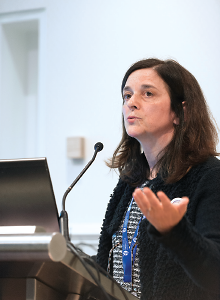Dixon Takes Editor’s Chair at Psychiatric Services
Abstract
The new editor at Psychiatric Services brings a long-standing commitment to services research and a desire to expand readership of the journal.Psychiatric Services has always been a journal that “speaks to me,” said new editor Lisa Dixon, M.D., M.P.H., of Columbia University.

Psychiatric Services has always been a journal that “speaks to me,” said new editor Lisa Dixon, M.D., M.P.H., of Columbia University.
Psychiatric Services has always been a journal that “speaks to me,” said new editor Lisa Dixon, M.D., M.P.H., of Columbia University.
On January 1, Lisa Dixon, M.D., M.P.H., became the new editor of Psychiatric Services, a journal that has been central to her career as a psychiatrist.
Dixon, a professor of psychiatry at Columbia University and the New York State Psychiatric Institute, hopes to build on Psychiatric Services’ current stature in the field by opening new avenues of discussion within the journal and expanding its readership.
The publication focuses on developments in the delivery of mental health services, especially for people with serious mental illness in community-based treatment programs.
In a recent interview, Dixon praised outgoing editor Howard Goldman, M.D., for developing Psychiatric Services’ scientific base while combining policy and clinical aspects of the field.
“You can’t have one without the other,” she said. “Howard enhanced the rigor in the overall science of health services research. I want to maintain and improve what he has accomplished.”
Dixon’s encounters with the world of mental illness and health are both professional and personal. She has been a clinician as well as a health services researcher. She maintains a small practice and is the director of the Division of Behavioral Health Policy and Research at Columbia. Her interest in service delivery is not surprising: she knows from personal experience the challenges that families face when a loved one has a serious mental illness—her brother has schizophrenia.
Taking the important findings and scientific observations in Psychiatric Services and bringing them into the conversation about provision of behavioral health care services is critical, she said. “I want to hear what others are saying and then have all voices contribute to and benefit from that conversation.”
Beyond that, Dixon wants to advance the relevance in Psychiatric Services articles by including interpretations of the research—thoughtful explanations of why the content matters to clinicians and researchers. She hopes to expand the variety of commentary by including letters to the editor, comments, Taking Issue, and several regular columns. She plans to add a technology column and bring in an internist to co-edit a column on integrated care with Emory University psychiatrist Benjamin Druss, M.D., M.P.H.
Yet another goal is to increase the journal’s readership by reaching out beyond psychiatry to a multidisciplinary audience and expanding distribution beyond the ink-on-paper issue.
“That’s not about the quality of the journal but how we disseminate the content,” she said. “We have the potential for a much bigger audience by expanding our use of electronic means of distribution.”
Those might include podcasts and multimedia.
Like many other journals, individual print subscriptions to Psychiatric Services are down as more and more readers gain online access through their institutions’ subscription. The robust online usage of Psychiatric Services’ content confirms this readership habit change.
“We welcome Lisa Dixon as an editor for APA’s family of journals,” said APA CEO and Medical Director Saul Levin, M.D., M.P.A. “Her energy, her vision for expanding an already successful Psychiatric Services, and the team of editors and reviewers around her, will see the journal grow in this era of consumer-focused community psychiatry and collaborative care.”
Dixon will spread the word at this year’s APA Annual Meeting, being held in San Diego from May 20 to 24. Psychiatric Services has organized one presentation for potential contributors and another, with John Fortney, Ph.D., and Jürgen Unützer, M.D., M.P.H., on measurement-based practice.
For Dixon, the editorship is something of a homecoming.
“This has always been my journal,” she said. “I feel privileged to prioritize and shape the research that comes in.” ■
Psychiatric Services can be accessed here.



